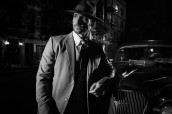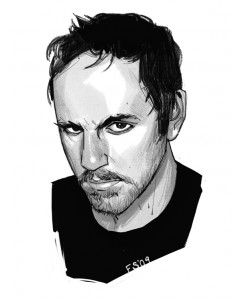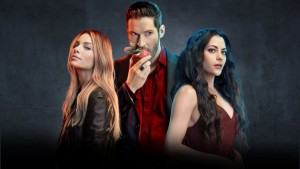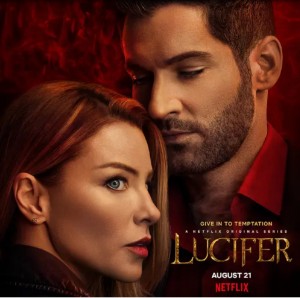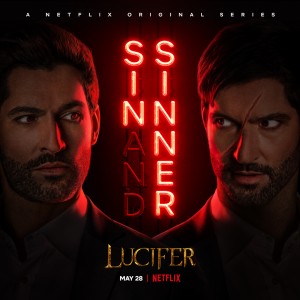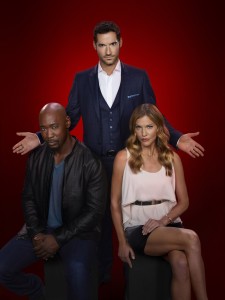LUCIFER’s sixth and final season – now streaming on Netflix with all previous seasons – had some new challenges. Among these was how to keep in line with the show’s procedural format now that detective Chloe Decker (Lauren German) and her consultant (among other things) Lucifer (Tom Ellis) had left the police force, in anticipation of Lucifer becoming God.
Co-executive producer Mike Costa wrote the LUCIFER Season 6 premiere, “Nothing Ever Changes Around Here.” The episode has Lucifer and Chloe going to the Magic Castle (a real establishment in Hollywood) to see magicians perform, only to get caught up in the investigation when a murder is committed in front of them. Meanwhile, Mazikeen (Lesley-Ann Brandt) and fiancée Eve (Inbar Lavi) thrash out their relationship issues over dinner with Linda (Rachael Harris) and Amenadiel (DB Woodside).
Costa has said that Daniel Espinosa, played by Kevin Alejandro, is his favorite regular LUCIFER character. Dan died heroically in the penultimate episode of Season 5. In the Season 6 premiere, we find that Dan is stuck in Hell, trapped by his own guilt over something he can’t consciously recognize. Although Lucifer has ordered that Dan not be tortured, the poor soul is unbearably bored, because, well, see the episode’s title.
Alejandro, who also helmed several other LUCIFER episodes, directed “Nothing Ever Changes Around Here.” Unfortunately, due to COVID, Costa says in an exclusive phone interview that he and Alejandro didn’t get to work together the way writers and directors normally would on the show, and discusses other aspects of the Season 6 premiere.
ASSIGNMENT X: Was one of the challenges in Season 6 trying to come up with ways to keep Lucifer and Chloe investigating something now that they’re not with the LAPD?
MIKE COSTA: Yeah, obviously, that was the intention of the first episode. We [in the writers’ room] try to think of it more from a character perspective; we want to demonstrate how things have changed for Chloe in the same way we’ve demonstrated how things have changed for Lucifer, and we want to set up the larger complex of the season. And so, that became very clearly, Chloe has retired from the police department, because she’s going to basically be with Lucifer now, in grounded language, support his career the way he supported hers.
But now they’re faced with a crime, and Chloe just can’t help herself, because she misses it too much. So, that was baked in, that they would be investigating. And then, going forward, yeah, you want them to be solving a problem for the episode. We drifted further and further away from the classic police procedural as the show went on. Essentially, “Daniel Espinosa: Naked and Afraid” [a Season 5 episode written by Costa] has no procedural elements to it. A crime occurs, but he’s more surviving than trying to find clues and interview suspects [laughs].
And so, [in Season 6] we had episodes like Lucifer searching for the woman that must be the mother of his daughter [Rory, played by Brianna Hildebrand]. That was a whole episode, and it has procedural elements, in that you’re going and you’re interviewing people, and you’re trying to figure something out, but it’s not a murder, and they’re not doing it as police officers. So, we did try and find things like that to do with the show, to maintain the structure and the spirit of what the show always has been.
AX: Is there a different kind pressure in writing a season premiere, as opposed to a regular episode?
COSTA: I don’t know if I want to say “pressure.” I guess it could be pressure, but I think the pressure comes from the idea that it’s sort of a big deal to write a season premiere, at least in the TV writer world. I’m sure that normal people watching television don’t pay any attention to who writes any episode, because they’re just enjoying the show, and it’s only very specific people that are very interested in television that pay any attention at all. But among those people, you watch who writes the season premiere, because usually the season premiere is written by a show runner, or if not a show runner, then a writer who is very high-stature on the show.
It’s very unusual that a lower-level or first-time writer is writing a season premiere, because you do have to do a lot with a season premiere that you don’t necessarily have to do with another episode in the season, except for a finale, which is why the finales are also usually written by the show runner or, likely or not, another very senior writer, because there is a lot of responsibility there.
The larger challenge, I would say, is that the episode has to do a lot. It has to tell its own story, like every episode does, but more than any other episode, [the season premiere] has to recap the story that’s already happened. The beginning of the season is always the time for, “Okay, here’s where we were, here’s where we are, and here’s where we’re going.” Those are the three things that a season [premiere] has to do in some way or another. I mean, obviously, there are examples that go off to left field, but those are intentionally subversive. The real idea of a season premiere is to do those three things, which is two more things than most episodes have to do [laughs].
So, that’s the reason why the scene with the cop is there in the beginning, because Lucifer gets to talk about what has happened, and how he feels about it, and what’s going on now. And it just gave us a very clean opportunity to establish, “Okay, here’s where we are. Everybody saw at the end of last season, he became God. Now he’s driving around Los Angeles. What’s going on? This is not picking up directly from that moment, so where is he, and what has happened?” That was our opportunity to do that.
And I will give credit to [LUCIFER co-executive producer/writer] Chris Rafferty. The idea of Lucifer being pulled over by that cop [Officer Diggs, played by Matt Corboy, who also played the character in LUCIFER’s series debut episode] again was his, and I think it’s the best idea in the whole episode. It does so many things at once. It allows for that exposition, and my favorite thing it does is that it allows us to show how Lucifer has grown as a character, because he deals with the cop in a completely different way this time than he did when he was pulled over in the beginning of Season 1. He’s not trying to entice or tempt this guy, he’s not reveling in the guy’s sin. He’s actually much more attuned to what’s going on with him, and he cares more about him, because he’s grown as a person.
Also, it gives us a great homage to our first episode in a way that brings closure. That’s one of the things that we obviously had to do with this season, is bring closure to all of these stories, and it was a nice juxtaposition, an echo, to see that cop again. And also, one of the things that I enjoy most is writing characters that are in dire straits but don’t know it [laughs], which is why I love Dan so much. And it was fun to show how this cop’s life had been ruined by an interaction with Lucifer, but he’s still very positive about it, still trying to look on the bright side. So, that was us attempting that first thing.
And then you have to establish, okay, the new dynamic of the show for this season is that Lucifer and Chloe are not police officers anymore, but they still have to be involved in solving cases at least occasionally, because that’s what the show is. So, the Magic Castle allowed for that, because they could be stuck there where a murder happened.
And again, setting up what’s going to happen with stakes in this season. What is the story of the season going to be? Which obviously comes at the end with, “Oh, no, who is this on Lucifer’s throne?” All of that stuff, I think, is handled pretty simply. Like, you have the scene with the cop, he talks about where he was. You have the murder at the Magic Castle. And then you have the scene where you see he’s not on the throne anymore. Those all seem pretty simple, but they took a very long time to figure out.
So, it was a harder script than I’ve had to write before. In a way, weirdly, the easiest script I ever wrote was “Naked and Afraid,” even though it was the most off-brand and unusual script, just because I so knew what that story needed to be. And when you have a season premiere, the story has so many more requirements. It takes a long time to figure that stuff out.
AX: Did you get to work more with Kevin Alejandro on “Nothing Ever Changes Around Here” than you normally do, because he was directing as well as acting?
COSTA: I guess yes, but ultimately much less than I would have, because of the pandemic. LUCIFER was actually one of the first shows to come back into production after the shutdown starting in March. We were shooting again in August. I think a couple shows had come back first, but I also think we were maybe the first or one of the first Warner Brothers shows. But regardless of what number we were, we were in that first wave of the first shows to come back into production.
It was this show that our crew and our production had been running smoothly for years, so it was one of the shows that they trusted, that they knew that there weren’t any significant problems or speed bumps going on in the first place, so it was something that they felt comfortable going out with first, which was very flattering to us.
But also, it presented a lot of really serious challenges. The studios had put together safety protocols, and they’d done months of work trying to figure out how will production come back, and what will it look like, which obviously, great [laughs]. But we were the first people to try it, so it was all brand-new territory for us. No plan survived contact with the enemy. So, it was a lot of figuring out what to do, and that added a lot of extra pressure to the fact that it was my episode, and the first episode of the season [laughs], because it had all these other challenges on top of it, which was actually part of the reason why the entire episode essentially takes place either in the Magic Castle, or in Linda’s house. In a way, it’s sort of a bottle episode, and why it’s only two stories going. Half the characters are in this location, half are in this other location, and we just cut back and forth between the two of them.
It made production as simple as we could possibly have done. I don’t think we’ve ever done an episode with fewer locations than that. But it worked for the story. There’s a dinner party, and then they’re at the Magic Castle. So, I don’t think it felt like we were trying to cut down on the locations, but it was written in such a way to make it as simple as possible to shoot, with as few locations to have control over.
But ultimately, because of the pandemic, I only went to set one day, and it was on the final day of shooting the episode, which was the day we shot on the street, so we were also outside. So, my collaboration with Kevin was done mostly in Zoom meetings, before we started shooting, and then afterwards, by text, because the studio created an uplink where, from my home, I could log into a program that allowed me to see what the cameras were shooting, while they were shooting it, so that if they had questions for me – “Hey, should we change this line, or what about this?” That happens all the time on set – I was watching, and I knew what was going on. But it was all done over text.
Normally in a production, I’m standing near the director the entire eight, nine days of shooting. Even if I’m not doing anything, even if I’m never interfering, or nobody has a question for me, it still feels collaborative. I’m there, I’m part of it, it’s a lot of fun, I get to know the director, I get to learn. And I didn’t really get that experience with Kevin, which is too bad, because I do think Kevin is a very good director, and I think he did a really good job particularly directing that episode. But I didn’t get to work with him as much as I wished that I had, because of the pandemic.
AX: Given that you were looking at ways to be creative with COVID, did anybody ever pitch an episode of, “What if half the characters are invisible for some reason?,” so you’d have fewer actors on set?
COSTA: My episode was probably as close to that as possible, where obviously nobody was invisible, but it was like, “What if everybody stays in the same spot the whole time [laughs], so that we’re not going to just a bunch of different locations, and there is a set amount of people that you see. There are no extra characters there. Let’s restrict this episode as much as humanly possible.” Because I think after that, we did feel increasingly comfortable making the episodes more and more like traditional episodes of LUCIFER, and then, not even by the end, really by the second episode even, I don’t think you can necessarily tell.
I’m a member of the Magic Castle, and I have been for a decade, and I go there all the time, and I’m very active there, so I know that there should be more people. That’s a thing that always bothered me – “If this show is happening at the Magic Castle, there’d be a lot more people watching it.” But we tried to make it seem like it was a very exclusive engagement, and only a few people were there, but that looks very anemic to me. There are just too few people there. And that was definitely a COVID thing of, “We need as few people as possible.” Whereas other episodes, I don’t think that you’d notice that as much.
AX: As you’re a member of the Magic Castle, do you do magic?
COSTA: I amateurishly perform magic. I would say that I am a magic enthusiast. I’m friends with a lot of real professional magicians. In fact, many of those magicians appear in that episode. I was really glad I was able to get a bunch of actual, real magicians in that episode. And compared to them, I’m – it’s like being part of the Beer League baseball, but then you’re friends with a guy who’s in the MLB.
AX: How did you get into doing magic?
COSTA: When I started writing full-time, I was originally writing comic books. That was my first full-time writing gig. I no longer had to go into an office, I had a lot more time at home, and I thought, “I want to pick up a hobby, so that I don’t waste all this time just laying on the couch, watching TV.” And card magic, one, appealed to me because there’s a lot of real elegance to it. I saw a performance by a magician named Ricky Jay [in his show called RICKY JAY AND HIS 52 ASSISTANTS]. That made a huge impression on me, and I’m like, “I want to do that.”

Tom Welling, Rachael Harris, DB Woodside, Tricia Helfer, Aimee Garcia, Kevin Alejandro, Lauren German, Tom Ellis and Lesley-Ann Brandt in LUCIFER – Season 3 |©2016 Fox/Jason Bell
Also, so much of magic involves very specific objects – “Oh, here’s this tiny chest from the Orient,” and you have all these stupid stories to excuse or explain why you have this ridiculous, unlikely object that clearly is somehow gaffed so that you can do something magical with it. But everybody has a deck of cards, so it’s something that you can pick up anywhere, and that really appealed to me.
Coin magic is similar, obviously, because there’s a lot of magic that you can do with coins, but here’s a little magic insight. Coin magic is very difficult. Card magic is easier. It’s a lot easier to palm a card than a coin [laughs], a lot easier. So, there you go.
STAY TUNED FOR PART 4
Related: LUCIFER: Exclusive interview with Kevin Alejandro chats more about Season 5B and more – Part 2
Related: LUCIFER: Exclusive interview with Kevin Alejandro on Season 5B and more – Part 1
Related: LUCIFER: Exclusive interview with Kevin Alejandro on Season 4 – Part 1
Related: LUCIFER: Exclusive interview with showrunner Joe Henderson on Season 4 and Season 5 – Part 2
Related: LUCIFER: Exclusive interview with showrunner Joe Henderson on Season 4 and Netflix – Part 1
Related: LUCIFER: Exclusive interview with Tricia Helfer on playing the Supreme Goddess on Season 3
Related: LUCIFER: Exclusive interview with actress Aimee Garcia on Season 3
Related: LUCIFER: Exclusive interview with Kevin Alejandro on Season 3
Related: LUCIFER: Showrunner and executive producer Joe Henderson on Season 3 – Exclusive Interview – Part 1
Related: LUCIFER: Joe Henderson and Ildy Modrovich on Season 2 – exclusive interview
Related: LUCIFER: Kevin Alejandro chats about his rivalry with the devil – exclusive interview
Related: LUCIFER: Lauren German on working with the Devil – exclusive interview
Related: LUCIFER: Jonathan Littman on having fun with the devil – exclusive interview
Follow us on Twitter at ASSIGNMENT X
Fan us on Facebook at ASSIGNMENT X
Article Source: Assignment X
Article: LUCIFER: Exclusive interview with writer and co-executive producer Mike Costa on the Season 6 premiere – Part 3
Related Posts:




